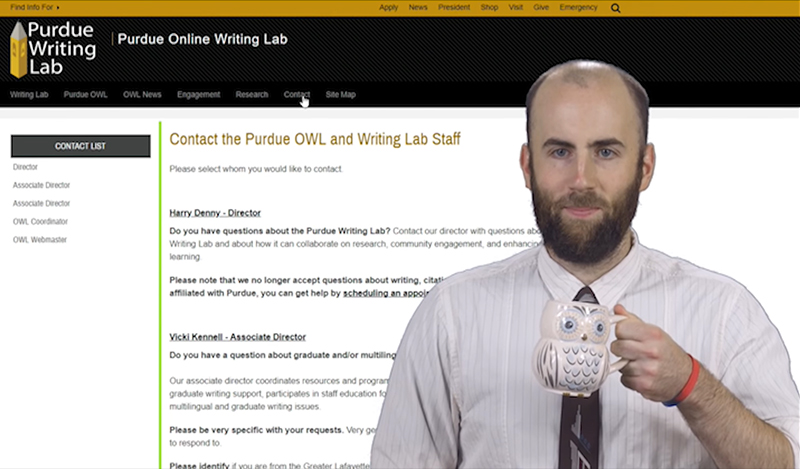The OWL at 25: Insider's perspective
Content coordinator Joe Forte on his OWL experience

You’d be surprised what people send the OWL.
In the time I’ve been content coordinator for the OWL, I’ve read innumerable messages from our readers. The majority are mundane nitpicks. Messages pointing out minor typos or asking for clarification on some citation topic are daily affairs.
But some are anything but mundane. One user with an email address associated with a Kentucky middle school wrote to tell us: “My established group of peers have decided that Comic Sans is the best decision for writing academic essays.” One user last week offered the site his services as an SEO expert under the impression that the OWL sold vape and CBD products (I politely declined). Another user asked us to weigh in on the firing of a colleague who was let go for poor communication skills (this I also declined).
However, as fun as those sorts of messages can be, they aren’t the ones I look forward to most. I’m even more excited to get messages like this one (reproduced below in its entirety):
“Dear staffs in the Purdue Writing Lab. Hello. I am a foreign student who studies in Korea. I have had many difficulties from learning MLA formatting. But your presentation files help me a lot. Thank You So Much!”
I prize these sorts of messages because these are the ones that remind me what 25 years of the OWL mean: a generation of students who know that they can get free, top-quality writing resources, no matter who they are or where they come from.
As content coordinator for the OWL, I ensure that the OWL continually produces new content, and that that content is designed with our readers in mind. Because our readers come from all over the world (and because they are not only students, but also educators, librarians, administrators, and private citizens), the OWL must produce many different kinds of content. This means I often find myself playing several different roles per day.
For instance, I act as manager and editor for dozens of our content developers – mostly graduate students – who produce new content for our site and YouTube channel. I also sometimes write content for the site myself. I’m particularly proud of two resources written earlier this year in collaboration with my colleague Tony Bushner that teach readers how to avoid the pitfalls of “citation generator” and “grammar checker” apps. Sometimes I handle copyright requests for OWL content from textbook companies and government agencies (most recently, a prison). And, of course, I always read and respond to messages from our users. That’s where the real fun is, after all.
Sometimes, my job is very easy. I’m blessed that my fellow graduate students, who work as content developers, are some of the smartest and most resourceful people I’ve ever met. I’m frequently humbled by their ability to find directions for OWL content that would never occur to me. One of my favorite new pieces – a guide to writing about film – came about when a developer pitched an idea to me unprompted. I also benefit immensely from the sage guidance of our directors, Harry, Tammy, and Vicki, my colleague Tony, and all the Writing Lab staff. These people all contribute some unique bit of expertise or experience to the task of serving our readers every day.
There are also aspects of the job that aren’t easy. For instance, the fact that many people believe that the OWL sets language guidelines, rather than merely documenting guidelines set by others, can make us a lightning rod for cultural controversies. And, of course, the OWL must constantly contend with the fact that its graduate student contributors are extremely busy. This, more than anything else, limits what the OWL can do.
However, the hardest thing about being content coordinator is the silence that inevitably comes after we publish something new. Despite the OWL’s prodigious traffic numbers, we almost never receive user feedback on new content until long after it’s published. Thus, it’s usually hard to tell whether a particular piece of content that my colleagues or myself worked hard on has resonated with our readers.
But every once in a while, we do get hints about how we’re doing. Sometimes the hints are straightforward messages of gratitude like the one from the Korean student above. Often, however, these hints come in unexpected forms. They come when a stranger on social media replies to a friend’s complaints about her teacher by sharing a very familiar set of links. They come when the person you’ve just met at a party tells you precisely which pages saved their life in college after you tell her what you do for a living. They come when high schoolers touring Purdue’s campus take a detour to squat, unassuming Heavilon Hall to grab OWL-branded pencils for their homeroom teacher.
How odd it must seem that the OWL would inspire such strong emotions in its users. Is it really possible for so many people to feel a bond to a website known mainly for citation instructions? Is it really true that the difficulties of writing are such universal experiences that people all over the world might have some investment in this humble website’s future?
Like I said: you’d be surprised.